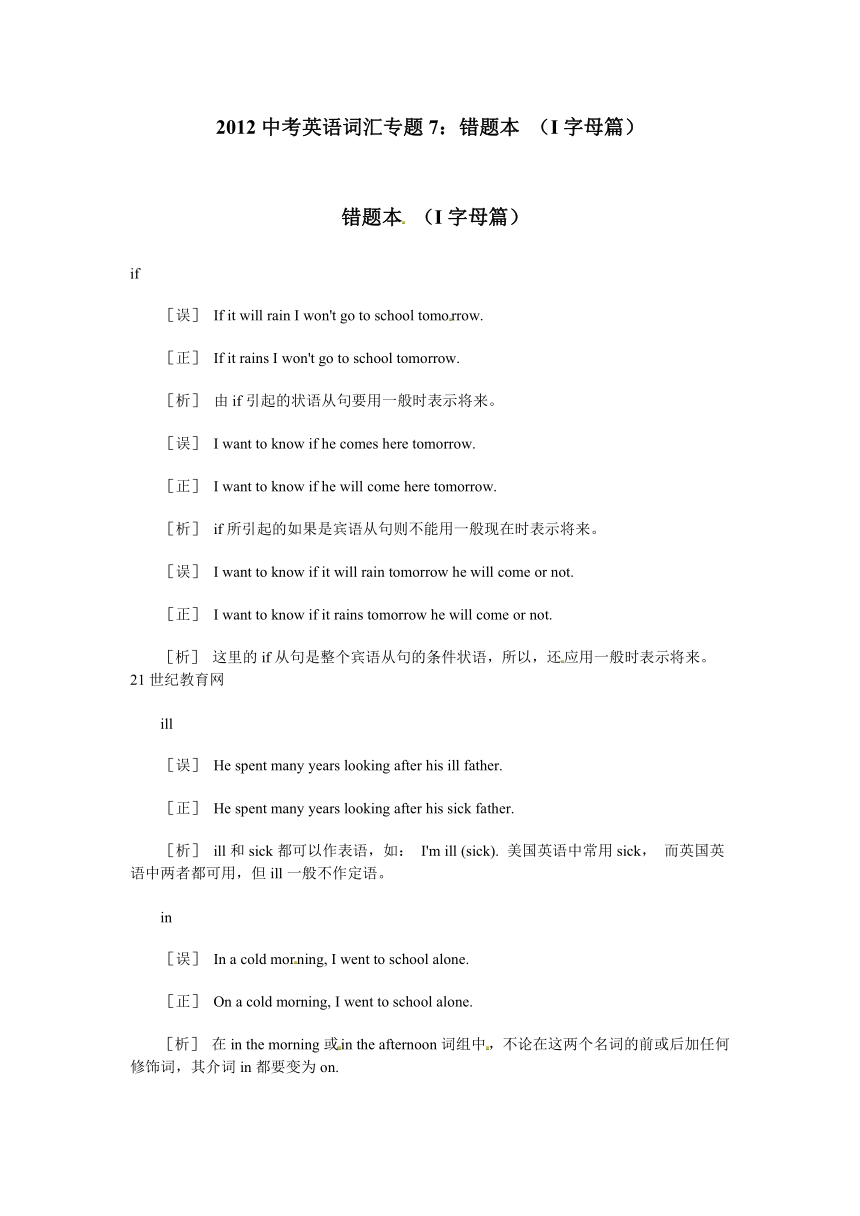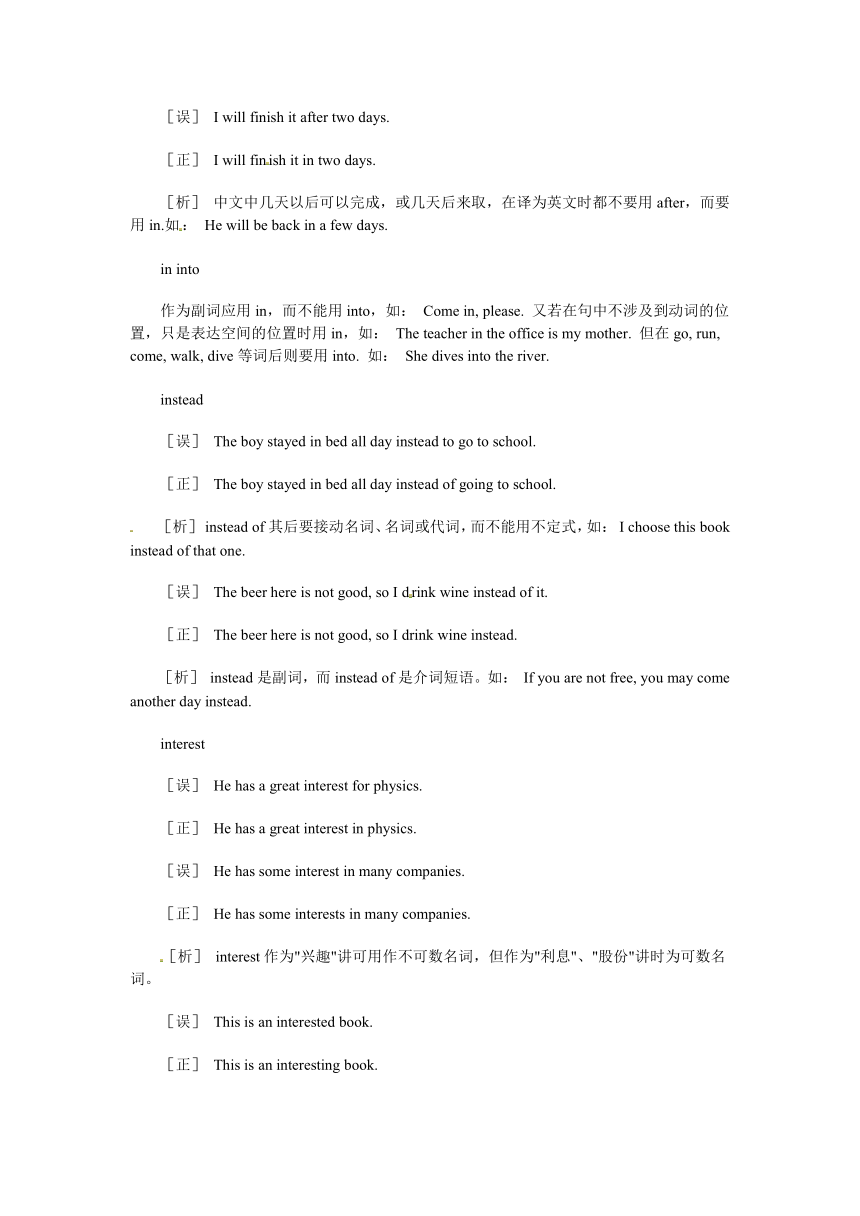2011中考英语词汇专题7:错题本 (I字母篇)
文档属性
| 名称 | 2011中考英语词汇专题7:错题本 (I字母篇) |

|
|
| 格式 | zip | ||
| 文件大小 | 24.3KB | ||
| 资源类型 | 教案 | ||
| 版本资源 | 通用版 | ||
| 科目 | 英语 | ||
| 更新时间 | 2011-11-16 10:43:35 | ||
图片预览


文档简介
2012中考英语词汇专题7:错题本 (I字母篇)
错题本 (I字母篇)
if ?
[误] If it will rain I won't go to school tomorrow.?
[正] If it rains I won't go to school tomorrow.?
[析] 由if引起的状语从句要用一般时表示将来。
[误] I want to know if he comes here tomorrow.?
[正] I want to know if he will come here tomorrow.?
[析] if所引起的如果是宾语从句则不能用一般现在时表示将来。
[误] I want to know if it will rain tomorrow he will come or not.?
[正] I want to know if it rains tomorrow he will come or not.?
[析] 这里的if从句是整个宾语从句的条件状语,所以,还应用一般时表示将来。? 21世纪教育网
ill ?
[误] He spent many years looking after his ill father.?
[正] He spent many years looking after his sick father.?
[析] ill和sick都可以作表语,如: I'm ill (sick). 美国英语中常用sick, 而英国英语中两者都可用,但ill一般不作定语。?
in ?
[误] In a cold morning, I went to school alone.?
[正] On a cold morning, I went to school alone.?
[析] 在in the morning或in the afternoon词组中,不论在这两个名词的前或后加任何修饰词,其介词in都要变为on.?
[误] I will finish it after two days.?
[正] I will finish it in two days.?
[析] 中文中几天以后可以完成,或几天后来取,在译为英文时都不要用after,而要用in.如: He will be back in a few days.?
in into ?
作为副词应用in,而不能用into,如: Come in, please. 又若在句中不涉及到动词的位置,只是表达空间的位置时用in,如: The teacher in the office is my mother. 但在go, run, come, walk, dive等词后则要用into. 如: She dives into the river.?
instead ?
[误] The boy stayed in bed all day instead to go to school.?
[正] The boy stayed in bed all day instead of going to school.?
[析] instead of其后要接动名词、名词或代词,而不能用不定式,如: I choose this book instead of that one.?
[误] The beer here is not good, so I drink wine instead of it.?
[正] The beer here is not good, so I drink wine instead.?
[析] instead是副词,而instead of是介词短语。如: If you are not free, you may come another day instead.?
interest ?
[误] He has a great interest for physics.?
[正] He has a great interest in physics.?
[误] He has some interest in many companies.?
[正] He has some interests in many companies.?
[析] interest作为"兴趣"讲可用作不可数名词,但作为"利息"、"股份"讲时为可数名词。?
[误] This is an interested book.?
[正] This is an interesting book.?
[析] 修饰物时应用interesting, 如,an interesting film,而讲某人对某事感兴趣时要用过去分词interested,如: I'm interested in this play. 但"他是一个十分有趣的人"。应译为He is an interesting man. 所以interesting是"令人感兴趣"之意,而interested则表示某人对某事物感兴趣,多用"be interested in something"这一句型。?
invent ?
[误] America was invented by Christopher Columbus in 1492.?
[正] America was discovered by Christopher Columbus in 1492.?
[析] invent意为"发明"即从无到有,如: Compass was invented by the Chinese people. 而discover则意为"发现"。?
it ?
[误] That takes me ten years to finish this work.?
[正] It takes me ten years to finish this work.?
[析] it在这个句中的语法作用是形式主语,而真正的主语是句子后面的不定式。有的句子要用it作形式主语或形式宾语,如: I think it difficult to learn English well.
2011中考英语考前错题本 (J字母篇)
join ?
[误] Did you attend the football club ?
[正] Did you join the football club ?
[析] join经常用于参加某个团体、政党,并作为其中的一个成员;attend则重点强调出会议、到场,而不一定进行具体活动,如: Did you attend the meeting yesterday 而take part in则强调参与某些具体活动或运动,如: I take part in the football game.
?
just ?
[误] I have finished my work just now.?
[正] I finished my work just now.?
[析] just now意义"刚才",所以句中的谓语动词要用过去式。?
[误] Just I won the game.?
[正] I just won the game.?
[析] just单独使用时不应放在句首,而应放于① be动词之后,如: He is just a student.② 名词与一般动词之间。③ 用在第一助动词之后,如: I have just returned home. 但just与其他词组成词组时,如just now, just then, 则可用于句首和句尾。如: Just then he saw the bus coming.?
just justly ?
just常用于三种含意: ① 恰好,如: It's just five o'clock. ② 仅仅,相当于only, 如: I have just enough money to buy a dictionary. ③ 不久前,如: I just missed my old friend; He left a few minutes ago. 而justly其意为"公正的",如: He was justly punished for his crimes.?
2011中考英语考前错题本 (K字母篇)
keep ?
[误] She was keeping something to her father.?
[正] She was keeping something from her father.?
[析] "对某人隐瞒某事"要用"keep something from somebody"句型。?
[误] He kept to repeat the word again and again.?
[正] He kept repeating the word again and again.?
[析] keep doing something为连续不断地做某事。有时可以与keep on doing something互换。它们的区别在于keep doing something意为该动作一直不停地在进行中,如: When the train started, she kept waving her hand. 而keep on doing something则表示该动作可能停停顿顿但却一直在进行中,如: He kept on making the same mistakes in grammar.
[误] We must keep up the times.?
[正] We must keep up with the times.?
[析] 这句话意为"我们必须赶上时代",keep up with是"赶上"之意,而keep up则是"坚持下去"的意思,如: Keep it up, don't stop now!?
key ?
[误] I lost the key of the door.?
[正] I lost the key to the door.?
[析] 英语中讲某某的东西一般要用of,而key, entrance, answer则多用to,如:"门的钥匙"为key to the door, "高速公路入口"为entrance to the highway, "问题的答案"为the answer (key) to the question.?
kind ?
[误] This kind of books are not good.?
[正] This kind of books is not good.
[析] kind在这种句式中应作为主语,如果讲Those kinds of books are very good. 则是正确的。?
kind sort type ?
kind和sort为同义词,意为"种类",而type则为"型号",如: What type of this car do you want (你想要这种车的什么型号 )?
knock ?
[误] Someone was knocking the door.?
[正] Someone was knocking at the door.?
[析] knock虽可以作及物动词,如: The car knocked a hole in the fence. 但作"敲门"讲一定要用作不及物动词: knock at (on) the door.?
know ?
[误] I want to know to play this game.?
[正] I want to know how to play this game.?
[析] 要注意英语中在不定式前加疑问代词或疑问副词的用法。如:I want to know how to do it / what to do / when to do it / where to go.?
know know of ?
I know him.为"我很了解他。"而I know of him. 则为"我听说过他。"同样的用法还有hear和hear of这一词组。
错题本 (I字母篇)
if ?
[误] If it will rain I won't go to school tomorrow.?
[正] If it rains I won't go to school tomorrow.?
[析] 由if引起的状语从句要用一般时表示将来。
[误] I want to know if he comes here tomorrow.?
[正] I want to know if he will come here tomorrow.?
[析] if所引起的如果是宾语从句则不能用一般现在时表示将来。
[误] I want to know if it will rain tomorrow he will come or not.?
[正] I want to know if it rains tomorrow he will come or not.?
[析] 这里的if从句是整个宾语从句的条件状语,所以,还应用一般时表示将来。? 21世纪教育网
ill ?
[误] He spent many years looking after his ill father.?
[正] He spent many years looking after his sick father.?
[析] ill和sick都可以作表语,如: I'm ill (sick). 美国英语中常用sick, 而英国英语中两者都可用,但ill一般不作定语。?
in ?
[误] In a cold morning, I went to school alone.?
[正] On a cold morning, I went to school alone.?
[析] 在in the morning或in the afternoon词组中,不论在这两个名词的前或后加任何修饰词,其介词in都要变为on.?
[误] I will finish it after two days.?
[正] I will finish it in two days.?
[析] 中文中几天以后可以完成,或几天后来取,在译为英文时都不要用after,而要用in.如: He will be back in a few days.?
in into ?
作为副词应用in,而不能用into,如: Come in, please. 又若在句中不涉及到动词的位置,只是表达空间的位置时用in,如: The teacher in the office is my mother. 但在go, run, come, walk, dive等词后则要用into. 如: She dives into the river.?
instead ?
[误] The boy stayed in bed all day instead to go to school.?
[正] The boy stayed in bed all day instead of going to school.?
[析] instead of其后要接动名词、名词或代词,而不能用不定式,如: I choose this book instead of that one.?
[误] The beer here is not good, so I drink wine instead of it.?
[正] The beer here is not good, so I drink wine instead.?
[析] instead是副词,而instead of是介词短语。如: If you are not free, you may come another day instead.?
interest ?
[误] He has a great interest for physics.?
[正] He has a great interest in physics.?
[误] He has some interest in many companies.?
[正] He has some interests in many companies.?
[析] interest作为"兴趣"讲可用作不可数名词,但作为"利息"、"股份"讲时为可数名词。?
[误] This is an interested book.?
[正] This is an interesting book.?
[析] 修饰物时应用interesting, 如,an interesting film,而讲某人对某事感兴趣时要用过去分词interested,如: I'm interested in this play. 但"他是一个十分有趣的人"。应译为He is an interesting man. 所以interesting是"令人感兴趣"之意,而interested则表示某人对某事物感兴趣,多用"be interested in something"这一句型。?
invent ?
[误] America was invented by Christopher Columbus in 1492.?
[正] America was discovered by Christopher Columbus in 1492.?
[析] invent意为"发明"即从无到有,如: Compass was invented by the Chinese people. 而discover则意为"发现"。?
it ?
[误] That takes me ten years to finish this work.?
[正] It takes me ten years to finish this work.?
[析] it在这个句中的语法作用是形式主语,而真正的主语是句子后面的不定式。有的句子要用it作形式主语或形式宾语,如: I think it difficult to learn English well.
2011中考英语考前错题本 (J字母篇)
join ?
[误] Did you attend the football club ?
[正] Did you join the football club ?
[析] join经常用于参加某个团体、政党,并作为其中的一个成员;attend则重点强调出会议、到场,而不一定进行具体活动,如: Did you attend the meeting yesterday 而take part in则强调参与某些具体活动或运动,如: I take part in the football game.
?
just ?
[误] I have finished my work just now.?
[正] I finished my work just now.?
[析] just now意义"刚才",所以句中的谓语动词要用过去式。?
[误] Just I won the game.?
[正] I just won the game.?
[析] just单独使用时不应放在句首,而应放于① be动词之后,如: He is just a student.② 名词与一般动词之间。③ 用在第一助动词之后,如: I have just returned home. 但just与其他词组成词组时,如just now, just then, 则可用于句首和句尾。如: Just then he saw the bus coming.?
just justly ?
just常用于三种含意: ① 恰好,如: It's just five o'clock. ② 仅仅,相当于only, 如: I have just enough money to buy a dictionary. ③ 不久前,如: I just missed my old friend; He left a few minutes ago. 而justly其意为"公正的",如: He was justly punished for his crimes.?
2011中考英语考前错题本 (K字母篇)
keep ?
[误] She was keeping something to her father.?
[正] She was keeping something from her father.?
[析] "对某人隐瞒某事"要用"keep something from somebody"句型。?
[误] He kept to repeat the word again and again.?
[正] He kept repeating the word again and again.?
[析] keep doing something为连续不断地做某事。有时可以与keep on doing something互换。它们的区别在于keep doing something意为该动作一直不停地在进行中,如: When the train started, she kept waving her hand. 而keep on doing something则表示该动作可能停停顿顿但却一直在进行中,如: He kept on making the same mistakes in grammar.
[误] We must keep up the times.?
[正] We must keep up with the times.?
[析] 这句话意为"我们必须赶上时代",keep up with是"赶上"之意,而keep up则是"坚持下去"的意思,如: Keep it up, don't stop now!?
key ?
[误] I lost the key of the door.?
[正] I lost the key to the door.?
[析] 英语中讲某某的东西一般要用of,而key, entrance, answer则多用to,如:"门的钥匙"为key to the door, "高速公路入口"为entrance to the highway, "问题的答案"为the answer (key) to the question.?
kind ?
[误] This kind of books are not good.?
[正] This kind of books is not good.
[析] kind在这种句式中应作为主语,如果讲Those kinds of books are very good. 则是正确的。?
kind sort type ?
kind和sort为同义词,意为"种类",而type则为"型号",如: What type of this car do you want (你想要这种车的什么型号 )?
knock ?
[误] Someone was knocking the door.?
[正] Someone was knocking at the door.?
[析] knock虽可以作及物动词,如: The car knocked a hole in the fence. 但作"敲门"讲一定要用作不及物动词: knock at (on) the door.?
know ?
[误] I want to know to play this game.?
[正] I want to know how to play this game.?
[析] 要注意英语中在不定式前加疑问代词或疑问副词的用法。如:I want to know how to do it / what to do / when to do it / where to go.?
know know of ?
I know him.为"我很了解他。"而I know of him. 则为"我听说过他。"同样的用法还有hear和hear of这一词组。
同课章节目录
- 词法
- 名词
- 动词和动词短语
- 动词语态
- 动词时态
- 助动词和情态动词
- 非谓语动词
- 冠词
- 代词
- 数词和量词
- 形容词副词及其比较等级
- 介词和介词短语
- 连词和感叹词
- 构词法
- 相似、相近词比较
- 句法
- 陈述句
- 一般疑问句和否定疑问句
- 特殊疑问句及选择疑问句
- 反意疑问句
- 存在句(There be句型)
- 宾语从句
- 定语从句
- 状语从句
- 主谓一致问题
- 简单句
- 并列句
- 复合句
- 主谓一致
- 主、表语从句
- 名词性从句
- 直接引语和间接引语
- 虚拟语气
- 感叹句
- 强调句
- 倒装句
- 祈使句
- 句子的成分
- 句子的分类
- 题型专区
- 单项选择部分
- 易错题
- 完形填空
- 阅读理解
- 词汇练习
- 听说训练
- 句型转换
- 补全对话
- 短文改错
- 翻译
- 书面表达
- 任务型阅读
- 语法填空
- 其他资料
